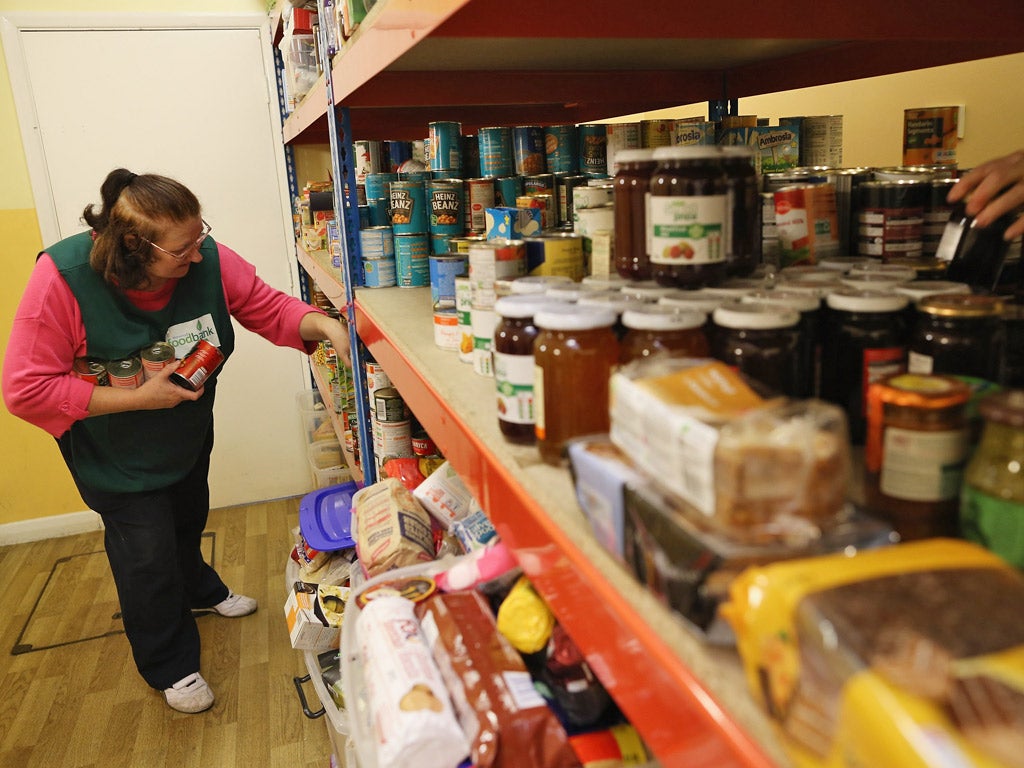Hungrier than ever: Britain’s use of food banks triples
The Trussell Trust reveals 350,000 people have received emergency handouts since April, while government poverty tsar, Frank Field, condemns figures as ‘shocking’

The number of people resorting to food banks for emergency help to feed their families has more than tripled following the squeeze on benefits which intensified in April.
David Cameron’s own poverty tsar warned last night of the danger of food banks becoming an “institutional part” of the welfare state – and urged the Prime Minister to set up an inquiry into the issue. Frank Field, a welfare minister under Labour, told The Independent he was shocked by the steep increase in their use and added: “Something very serious is happening to people at the bottom of society.”
The Trussell Trust, the country’s biggest food bank operator, said it distributed food to 355,985 people, including nearly 120,000 children, between April and September compared with 113,264 during the same period in 2012. It handed out food to more people during those six months than in the whole of 2012, the trust said.
It released the figures days after the Red Cross announced it planned to distribute food aid to the needy in Britain this winter for the first time since the Second World War.
The trust attributed the increase to above-inflation food and energy price rises and pay freezes, as well as the impact of welfare changes in April, including the introduction of the so-called “bedroom tax”, cuts in council tax benefits and changes to the rules governing crisis loans.
It said people going to food banks had started returning food that needed to be warmed up because they could not afford to switch on their electricity. More than 65,000 people were referred to food banks over the period because of benefit changes – a four-fold increase – and another 117,000 people were referred because of delays in paying their benefits.
Mr Field will meet senior Downing Street officials next week to discuss the rapid spread of food banks. The former minister said last night that food banks were a “thermometer” measuring the growing pressures facing Britain’s most hard-pressed families.
“Clearly something very serious is happening to people at the bottom of society which isn’t picked up in the official data,” Mr Field said.
“If you had said to me 10 years ago that we would be discussing the use of food banks, I would have led you to a dark room to recover.”
He said he had first asked the Prime Minister 14 months ago about the issue and had yet to receive a detailed response. Mr Field said he wanted to know whether Mr Cameron was “burying his head in the sand and hoping he could get through to the election.”
His call for an inquiry was backed by Chris Mould, the executive chairman of the Trussell Trust, which operates almost 400 food banks.
“The level of food poverty in the UK is not acceptable. It’s scandalous and it is causing deep distress to thousands of people,” Mr Mould said. “As a nation we need to accept that something is wrong and that we need to act now to stop UK hunger getting worse.”
Chris Johnes, Oxfam’s UK poverty programme director, said: “These figures lay bare the shocking scale of destitution, hardship and hunger in the UK. It is completely unacceptable that in the seventh wealthiest nation on the planet, the number of people turning to food banks has tripled.”
A government spokesman said it had taken action to ease the cost of living pressures on families by increasing the income tax threshold, pegging council tax for five years and freezing fuel duty.
He added: “The benefits system supports millions of people who are on low incomes or unemployed and there is no robust evidence that welfare reforms are linked to increased use of food banks.
“In fact, our welfare reforms will improve the lives of some of the poorest families in our communities with the universal credit making three million households better off – the majority of these from the bottom two-fifths of the income scale.”
A No10 spokesman said: “Food bank use went up 10 times under Labour. One of the reasons it has increased under this Government is that we have removed the block Labour put in place preventing jobcentres from referring people to food banks.“
But Frances O’Grady, the TUC’s general secretary, said: “These new figures show that despite trying desperately hard to make ends meet, hundreds of thousands of people still can’t afford to put food on the table for their families. Welfare reforms like the bedroom tax have pushed more households into food poverty.”
Join our commenting forum
Join thought-provoking conversations, follow other Independent readers and see their replies
Comments